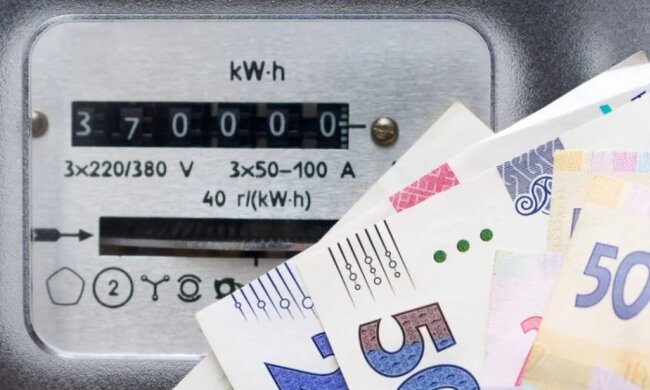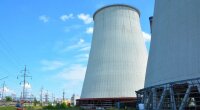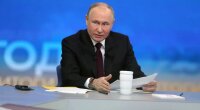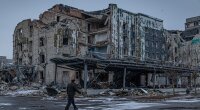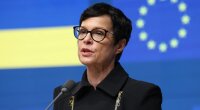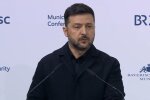1. Analysis of the first round results of presidential elections. The problem of bridging the gap between Timoshenko and Yanukovich. Impossibility of bridging the gap by electoral methods.
The first round showed that polarization of Ukraine has preserved – 60 % of electorate voted for antagonistic candidates.
Third force representatives won enough votes to have influence on the second round results. However there is uncertainty with relation to “vote migration” since none of the candidates who took 3-10 place is in a position to have 100 % influence on votes of their electors except perhaps Peter Simonenko’s electorate. Thereto, majority of candidates stated they will not support any race leader of elections.
Correspondingly the key aspect in regard to the prospects of the second round victory is the electoral core range of Victor Yanukovich and Yulia Timoshenko. It is appropriate to recall that Yanukovich is in 10.27 % lead after the first round.
This gap can not be bridged by electoral instruments (campaigning, propaganda, mobilization of supporters) for Timoshenko. She has not only to bridge the 10% gap but to gain maximum possible percentage in order to surpass Yanukovich since he will also increase his result.
Social research results show that Yanukovich may gain a majority of 7-8% over Timoshenko in case of natural history of events. Electorate migration data presented by leading Ukrainian sociological companies prove that. See table 1.
Table 1
Data on opinion poll results of different agencies on the second round of presidential elections in Ukraine, %
Company
Жителям двух областей приготовиться: где в Украине быстрее всего растут цены
Экс-глава Google: Войну в Украине завершит "стена дронов" и роботизированные килл-зоны
Паспортный контроль: почему украинцам за границей будут отказывать в документах без приложения "Резерв+"
Украина отвергла "бессмысленные" гарантии Трампа: детали тайных переговоров в Абу-Даби
Poll
date
Yulia Тimoshenko
Victor
Yanukovich
Against all
Will not go to the polls
Undecided
R&Bgroup
May 2009
28
37
19
7
9
R&Bgroup
June 2009
29
39
17
9
7
R&Bgroup
July 2009
28
35
20
7
9
R&Bgroup
August 2009
28
40
19
7
6
R&Bgroup
September 2009
30
38
18
8
6
R&Bgroup
September 2009
31
41
17
6
6
R&Bgroup
October 2009
30
42
15
7
7
R&Bgroup
November 2009
28
47
13
5
7
R&Bgroup
December 2009
30
47
13
4
6
Kiev international institute of sociology
January 4–13 2010
30.1
41.4
13.9
5.6
9
17 January 2010
37.67
44.37
17 January 2010
38.5
44.1
17 January 2010
37.5
44.1
14.4
4
It will be very difficult for Timoshenko to reduce more than 5% gap even in case of her fantastic activity in mobilization of her electorate.
Majority of experts questioned by the Foundation for safe society (hereinafter – FSS) are confident that voting turnout in the second round will not rise or will be lower.
For instance, Director of the center “Third sector” Andrei Zolotarev is convinced that voting turnout will be lower than in the first round – a great number of voters will lose voting motivation. The same viewpoint is supported by the famous political analyst Dmitriy Vydrin and also Director of Institute of political analysis and international research Sergei Tolstov.
Political strategist Pavel Каraichentsev considers that voting turnout will not rise but the resources that were little used in the first round will be deployed.
Mainly experts who are close to Yulia Timoshenko’s headquarters, e.g. Taras Berezovets predict significant increase in voting turnout. He thinks that voting turnout in the second round will be by one order greater – at the level of 80–85 % at the expense of mobilization of voters of both camps.
Mobilization can give about 0.5 mln extra turnout, hard mobilization — maximum 2 mln voters. It is insufficient to bridge the gap even if all the electors vote for Timoshenko (that is impossible).
Another important nuance – voting turnout in Western Ukraine was higher in the first round which means lower mobilization resources in the second round.
2. Possible instruments for bridging the gap in the second round of elections
Thus Yanukovich and Timoshenko face essentially different tasks to be tackled in the second round.
Victor Yanukovich’s minimal task – to prevent relaxation of his electorate and to secure voting turnout since in case of high enough voting turnout (over 55–60 % of the total number of electors) he can surely gain 10 % more at the expense of votes “migration” from the candidates who took 3-10 places in the first round and moderate mobilisation of his own electorate (forecast of “votes migration” see in Table 2).
If he holds this position he will win the elections with advantage providing full victory legitimacy to him. The preserved 10-11% gap in the second round will practically level any attempts to contest the results in the courts or declare them a consequence of massive fraud..
Table 2
“Votes migration” from the candidates who took 3-10 places in the first round to the race leaders, KIIS (arranged 2-3 weeks on average before the first round)
First round voting:
Second round voting:
Total
Yulia Timoshenko
Victor Yanukovich
Will not vote in the second round
Against all
Undecided
Bogoslovskaya Inna
0.3
0.1
0.4
Gritsenko Anatoliy
0.7
0.1
0.3
1.1
Litvin Vladimir
0.4
0.8
0.6
0.1
0.2
2.2
Simonenko Peter
0.3
1.4
1.4
0.1
0.1
3.3
Timoshenko Yulia
16.6
0
16.6
Тigipko Sergei
2.2
3.6
1.9
0.3
0.7
8.8
Тyagnibok Оleg
0.7
0.2
0
1
Yushchenko Victor
2.4
0.1
1.1
0.1
0.6
4.4
Yanukovich Victor
0
28.9
0
29
Yatsenyuk Arseniy
1.3
0.6
1.6
0.1
0.6
4.3
Against all
0.9
0.7
3.8
0.2
0.5
6.1
Will not take part in the elections
0.6
1
0.8
4.1
0.4
6.9
Undecided
3.9
3.8
2
0.5
5.1
15.3
Total
30.2
41.6
14
5.6
8.5
100
Yulia Timoshenko faces a number of tasks the main of which are:
1) to ensure maximum high turnout of her electorate in the second round;
2) to provide maximum migration of votes of those candidates who left the race for her own benefit applying various methods of influence on the electorate of Yatsenyuk, Tigipko, Yushchenko, Tyagnibok, Gritsenko. In this sense Timoshenko’s statement that she would have been in the ranks of “Ukrainian Sichovy Striltsy” (USS) if she had lived during World War One is a symbolic attempt to attract Yushchenko’s and Tyagnibok’s electorate;
3) to decrease voting turnout in Yanukovich’s basic regions;
4) to call voting legitimacy in the regions supporting Yanukovich in question.
Timoshenko has an opportunity to reduce the gap to the minimum of 2-3% after solving all the abovementioned tasks.
Thus Timoshenko has no chances to win the elections without deligitimization of the second round results in the South—East. The only opportunity of victory lies in the plane of court decisions. The rest of variants can be referred to the category of fantastic ones at this moment..
3. Instruments and methods for deligitimization of elections
The set of instruments for lowering legitimacy of the elections is rather big. However the following methods will be most likely applied in Ukraine:
А) Formation of an unalterable opinion that results of the elections will be rigged.
B) Discredit of sociology since it legitimizes result of the elections in the minds of electors. It is necessary to note that it is already practically a success. Such amount of various and contradictory sociological information has never been offered to voters in modern Ukrainian history. Monitoring results of 30 central and more than 500 regional media provide the following picture:
· Results of 63 sociological investigations by 32 sociological companies were published from October 19 till December 29 2009 that is within 71 days. In other words almost one investigation per day;
· 17 companies out of 32 ones were not known at all or displayed their activity only during election period in 2006/2007;
· 3 investigations were conducted by foreign companies;
· 4 public institutes to which sociological investigations are not primary or even priority kind of activity presented their research data;
· Two companies were involved in the scandals connected with obviously unreal ratings of candidates. In one case the scandal finished by court decision prohibiting to publish the data of one of the candidates;
· Data were published only in 22 cases at press—conferences or other public events;
· Press releases with the data of allegedly conducted polls were just sent to media in other 40 cases;
· Almost 152 thousand respondents were questioned including about 7 thousand by phone according to the published data;
· 15-20 mln UAH would have been spent on all the investigations if they had been conducted in reality;
· Approximately 51-53 mln UAH were spent on publication of research data in central and regional press.
C) Election vis major that will be interpreted as proofs of non-transparency of elections or its violations;
Г) Influence on representatives of election commissions and observers;
Д) Legal support of provocations and also invalidation of the vote in some election districts.
4. Mechanisms of integration of observers as active participants of elections affecting the final result and its legitimacy
Highly sought methods of observers integration at polling stations will most likely be the following ones:
a) Illegal campaigning;
b) Pressure on members of commissions using both administrative resources and observers. In this connection it is necessary to note the fact that most Georgian so—called observers are strong-built young men is not coincidental;
c) Informational excitement and provocations (“militants/circulators of dreadful infections, etc. will go to the elections that is why participation is dangerous”);
d) Violations fraud, their fixation for media, informing of international institutes representatives of them
How well—grounded are fears of such developments? Evidently we watched the preparatory stage in the first round when about 2000 Georgian citizens came to Ukrainian elections as observers exceeding the number of observers from all the other countries combined. This fact can not but arouse suspicion.
- Firstly, where did small Georgia find such a number of specialists in election monitoring and why did just Ukrainian elections arouse such interest?
- Secondly, Georgia is not a country of long-standing democracy, its political system is authoritarian. For instance, Georgia in the annual report of Freedom House of 2009 is inferior in relation to the degree of freedom not only to the Baltic states but to Ukraine. According to the estimates of Freedom House in 2009 Georgia was not even included in the group of “electoral democracy” (it was included in the list of “partially free” countries). Over the past few years different antidemocratic processes were observed in Georgia: persecution of opposition, forceful disruption of peaceful demonstrations, mysterious deaths of Georgian politicians-oppositionists, raids against oppositional media, etc.
Thus 2010 presidential elections in Ukraine establish a precedent for the first time in the world history when foreign observers became such a serious factor of the domestic policy process that they can potentially have significant influence on the result of the elections.
The irony of it is that there is a situation when a significantly weaker state in terms of resources and regional impact influences the processes in a big European country.
5. Risks of loss of statehood for Ukraine: history and modern times
The course toward disruption of elections is very dangerous in itself since legitimacy of the existing authorities is extremely low in Ukraine now. According to the KIIS data the Ukrainian authorities trust level dropped to critical values in 2009 – none of the central government authority is trusted even by 10 % of Ukrainians.
The greatest drop in trust is observed towards President and his Secretariat – 4.7 % and also Cabinet of Ministers – 6.7 % against 15–16 % in 2007. Verhovna Rada is trusted less than President and Secretariat – 4.2 %. Judicial system is trusted by 5.3 % of respondents in 2009.
In terms of regional view President and his Secretariat are trusted in the East of the country by 1.9 % (in 2007 – 6.6 %), in the South – 2.5 % (in 2007 – 12.2 %), in the Central part – 5.7 % (in 2007 – 17.6 %) and in the West – 9.0 % ( in 2007 – 24.8 %).
Cabinet of Ministers is trusted in the East by 3.2 % against 25.4 % in 2007 (hereinafter– comparison of indices of 2009 and 2007), in the South – 4.7 % against 21.7 %, in the Central part – 9.0 % against 11.4 % and in the West – 9.4 %, against 7.8 %.
Since the activity of Cabinet of Ministers is always strictly personified in the minds of most Ukrainians the figures prove that Yulia Timoshenko should not expect significant mobilisation and inflow of votes in the South-East.
It is necessary to note that a lot of candidates spoke in support of powerful hand and necessity of authoritarian reinforcement for stabilization of situation during election campaign for the first time for 19 years of independent Ukraine.
Illigitimacy of public authorities is connected with monstrous corruption and their inefficiency. People do not trust the state and highest officials and are still watching the situation indifferently.
The gates will open in fact for realization of various scenarios in Ukraine if the image of elections as a “sacral instrument” of influence on elites on the part of the people is ruined.
In the situation when people know that power is obtained in a dishonest way, when elites know that election is just fiction, when court in the country is not an institution solving conflicts inside the society then raising a question – why do we need this state? is obvious and logical.
Looking back it is clear that Ukraine went through negative historical experience of crises more than once due to illegitimacy of elections of representative authorities.
The most vivid example is Chernaya rada in 1663 when the lower cossacks and peasantry refused to acknowledge the results of hetman elections and elected its own hetman Ivan Bryuhovetskiy. Just then illegitimacy of elections resulted in abrupt escalation of conflicts followed by collapse of the Cossack state, emergence of two-three Ukraines. Eventually immense civil war broke out that went down in history referred to as Ruin.
As a result the Cossack state lost its sovereignty, Ukraine disintegrated and it disappeared from the political world map for more than 200 years.
The history repeated itself in 1917-1920 with the same plotline and the same deplorable consequences for Ukraine.
In 2010 Ukraine has approached a dangerous line again leading to a possible loss of statehood. Moreover the country is running a risk to plunge into the abyss of civil war again.
«Hvylya»
